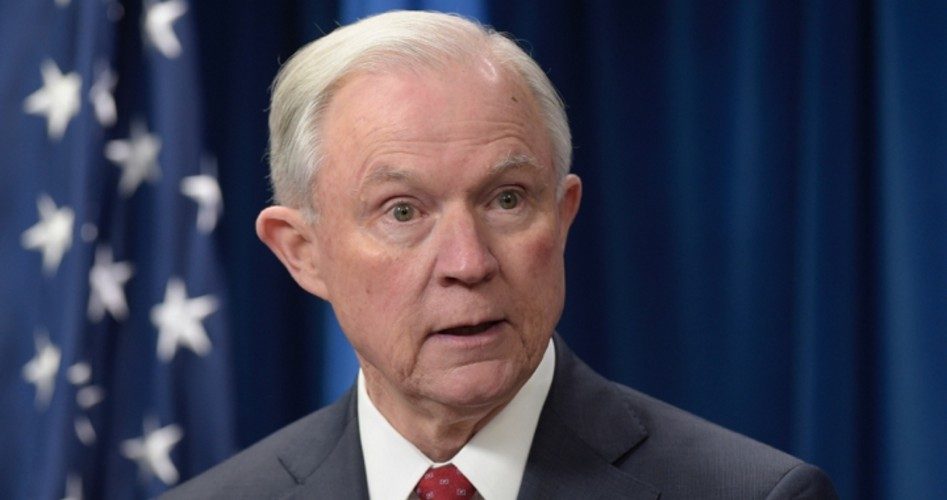
“Well, I’m going to do everything I possibly can to restore the independence and professionalism of the Department of Justice,” Attorney General Jeff Sessions (shown) told conservative radio talk-show host Hugh Hewitt during an interview Thursday. He was not ruling out the possibility of naming an outside counsel to investigate the handling of several matters by the Department of Justice during the tenure of his Obama-year predecessors, Eric Holder and Loretta Lynch.
“So we would have to consider whether or not some outside counsel is needed. Generally, a good review of that internally is the first step before any such decision is made,” Sessions told Hewitt.
Hewitt had asked Sessions, “How about an outside counsel, not connected to politics, to review the DOJ’s actions in those matters with authority to bring charges if underlying crimes are uncovered in the course of the investigation, and just generally to look at how the Department of Justice operated in the highly-politicized Holder-Lynch years?”
Any such “outside counsel” would certainly have a full plate of issues to review, and any such review of the actions and inactions of a prior presidential administration and its Cabinet officers would raise issues of its own.
Democrats have hounded Sessions to name a “special prosecutor” to handle any investigation into alleged ties President Trump or his aides had with the Russian government before the election. Sessions has announced he would recuse himself from any such investigation, choosing to pass that responsibility to his deputy attorney general. Rod Rosenstein is Trump’s nominee for that post.
Republicans, on the other hand, are more interested in the years of the Obama presidency, when Eric Holder and Loretta Lynch routinely ignored their calls for an outside counsel to investigate multiple alleged scandals. Among the possible allegations from the Obama era that could be probed include the accusations that the Internal Revenue Service (IRS) abused its power regarding Tea Party groups, the “gun walking” scandal that became better known as Fast and Furious, and the demands that an outside counsel look into the private e-mail server of former Secretary of State Hillary Clinton.
But an outside counsel might also look into the allegations of corruption at the Clinton Foundation, how the Justice Department handled the investigation into Clinton’s e-mail server, alleged leaks of classified information by the Obama administration during the campaign, and even President Trump’s allegation that American intelligence agencies illegally surveilled Trump Tower. Before the election, Trump regularly said he would appoint a special prosecutor to go after Clinton. But he backed off this threat after winning the election, disappointing many of his supporters, who regularly chanted, “lock her up” at his raucous rallies.
Sessions told Hewitt that he considered the IRS case, in particular, “of real concern.”
The central figure in the IRS targeting controversy was IRS Unit Director Lois Lerner. In that scandal, which came to light in 2013, the IRS either denied outright tax-exempt status to several Tea Party groups or other conservative groups, which kept them from participating in any effective way in the 2012 election, in which Barack Obama won re-election over Mitt Romney. The Washington Post reported that “IRS officials at the agency’s Washington headquarters sent queries to conservative groups asking about their donors and other aspects of their operations, while officials in the El Monte and Laguna Niguel offices in California sent similar questionnaires to tea-party-affiliated groups.” Lerner later denied that such targeting was part of a political agenda.
The Obama Department of Justice and the FBI later “found no evidence that any IRS official acted based on political, discriminatory, corrupt, or other inappropriate motives that would support criminal prosecution.”
Many critics of that report then and now argue that this should be a prime example of where a special prosecutor would be warranted, since it was an example of the administration giving itself a clean bill of health.
But it is not the only case that could merit a second look — or as many believe, a first look by an honest investigation. For example, the so-called Fast and Furious Scandal, in which the U.S. Bureau of Alcohol, Tobacco, Firearms and Explosives (ATF) ran a gunrunning “sting” operation during the Obama years, received what critics contend was an inadequate investigation, and even a possible cover-up, under Obama Attorney General Eric Holder. The goal of the gun sales was said to be to allow firearms purchases to be made so the government could track the guns as they were later transferred to higher-level traffickers and top officials in the Mexican drug cartels. About 2,000 firearms, less than half of which were recovered, were sold, leading to no arrests of high-level cartel figures.
In fact, some of the guns were later found at crime scenes in the United States and in Mexico, including where U.S. Border Patrol Agent Brian Terry was murdered in December 2010. In addition, it is estimated that at least 150 Mexican civilians were killed or wounded with the guns. The scandal led to Holder refusing to answer questions from Congress, and to President Obama invoking executive privilege to avoid further inquiry.
And, of course, there is the episode in which former President Bill Clinton met with Attorney General Loretta Lynch only one week before FBI Director James Comey opted not to prosecute Clinton’s wife, Hillary, for her role in the e-mail server scandal. The meeting, held on the tarmac of an airport in Arizona, was supposed to have been a secret, but a local reporter broke the story.
Clinton and Lynch later assured Americans that they did not discuss Hillary’s case, but rather it was just a friendly chat about their grandchildren and other personal matters.
Technically, a special prosecutor is a lawyer appointed by the attorney general to investigate a government official for alleged misconduct while in office. The appointment is for the purpose of avoiding a conflict of interest, or the appearance of a conflict. The Ethics in Government Act, passed in the aftermath of the Watergate Scandal, which led to President Richard Nixon’s resignation in 1974, gave the power to appoint an “independent counsel” to a special panel of the U.S. Court of Appeals for the D.C. circuit court. This law expired in 1999, by which time neither Democrats nor Republicans were happy with the law.
Some past investigations by “special prosecutors” were considered by many to have lasted far too long. Critics argued that the investigators turned into a “fourth branch” of government not subject to limits on spending or deadlines to wrap up their investigations. Lawrence Walsh, for example, spent years investigating the Iran-Contra affair, eventually winding up with little to show for it. Kenneth Starr was charged with investigating the infamous Whitewater affair, involving the Clintons, which morphed into an investigation of the sexual affair between President Clinton and his young intern, Monica Lewinsksy. Clinton was eventually impeached for lying under oath (which is a felony known as perjury) about his affair with Lewinsky (so as to frustrate a civil suit against him pressed by Paula Jones), but the Senate failed to convict him after the House impeached him. (The Senate vote was 50-50; conviction under the Constitution required a two-third majoirity vote.)
After dismissing two of his top aides, H.R. Haldeman and John Ehrlichman, President Nixon appointed a new attorney general, Elliot Richardson, directing him to designate a special counsel to conduct an investigation into the Watergate affair. At the time, there was no law governing the actions of the new “special prosecutor,” Archibald Cox. Nixon later fired Richardson for refusing to fire Cox, and also fired the deputy attorney general, William Ruckelhaus, who likewise refused to fire Cox. Finally, the third man in the Department of Justice, Solicitor General Robert Bork, completed the so-called Saturday Night Massacre by firing Cox. Bork later appointed Leon Jaworski to replace Cox, and Jaworski continued the Watergate investigation, which eventually led to Nixon’s resignation.
Appointment of a “special prosecutor” to look into allegations of criminal misconduct or other misbehavior by a prior administration would set a precedent, however, that makes many uneasy. While there is little doubt that the Obama administration was negligent in its own duty of ferreting out its own administration’s misconduct (to put it charitably), some are concerned that a new administration going after the previous administration would become a routine practice in American politics.
Were the Trump administration’s Justice Department — or even a special prosecutor appointed by Sessions or another person in the Justice Department — to obtain an indictment and even a conviction against Clinton, Lerner, Holder, or even Obama himself, there is little doubt that the Democrats would follow suit by investigating the Trump administration, were they to win the presidency after Trump’s term is over.
But at the same time, if the IRS were used as a weapon to limit political dissent, for example, and that action were to go unpunished, it is likely such unpunished activity will just occur again. After all, the Obama White House is hardly the first administration to be accused of using the tax laws to go after political opponents.
Perhaps the lesson in all of this is that we should be very careful in the creation of agencies such as the IRS that can wield such tyrannical power.
Photo of Attorney General Jeff Sessions: AP Images



